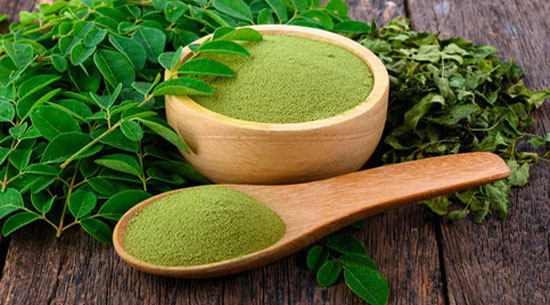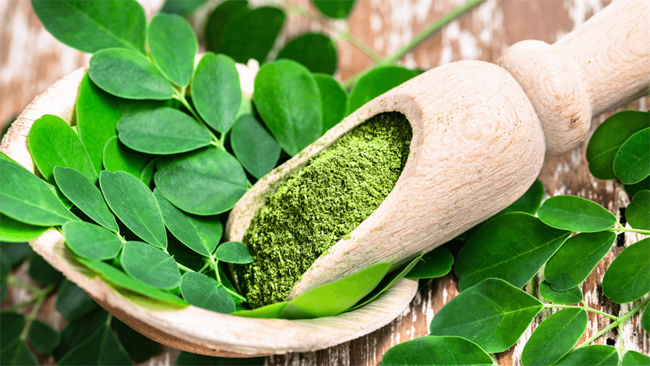What is Moringa?
Moringa Oleifera, popularly known as the “Miracle Tree,” is a fast-growing, drought-resistant tree native to the Indian subcontinent and portions of Africa. It contains over 90 phytochemicals that are protective in nature, including isothiocyanates, flavonoids, and phenolic acids. The Moringa tree, which belongs to the Moringaceae family, comes in roughly 10-15 different kinds. These are tall, leafy plants with pods or flowers on them. Moringa Oleifera was named “plant of the year” by the National Institute of Health because of its wide and unique ability to help reverse environmental issues. It is also recognized as a plant with several health benefits, including nutritional and therapeutic benefits.
Moringa has a long history of use, having been found thousands of years ago and was used to treat headaches, constipation, and inflammation. Hundreds of recent studies, articles and research papers suggest that moringa can help with blood glucose levels, lower cholesterol and LDL, increase libido, and alleviate other health issues.
Moringa is available in powder, nutritional bars, energy drinks, and as a topically applied oil.
Uses of Moringa
Moringa Oleifera has a long and illustrious history of use. Its traditional use has been modernized by more advanced investigations and research, and it has been identified as a Miracle tree.
Moringa includes a number of chemicals with health-promoting properties, including quercetin and beta-sitosterol, according to research. It also possesses anti-inflammatory chemicals, which may protect against health issues metabolic disorders, and chronic inflammation, such as cancer and cardiovascular disease. It may also aid in the treatment and/or prevention of a variety of chronic illnesses, including diabetes, high cholesterol, arthritis, asthma, and high blood pressure.
Take a look at some of the new information about moringa.
Diabetes: according to research and modest clinical studies, polyphenols from Moringa Oleifera control blood glucose levels and sensitize pancreatic Beta cells, resulting in enhanced insulin secretion. However, the actual mechanism of action is unknown.
Cardiovascular diseases: The key features of CVS disorders are high cholesterol levels, high triglyceride levels, high LDL, low HDL, and high blood pressure.
Moringa leaf extract has been shown in studies to have excellent balancing effects on all of these illnesses. Moringa Oleifera decreases cholesterol levels while maintaining the proper quantity of triglycerides in the blood. It also aids in the reduction of high blood pressure, which has a good impact on the cardiovascular system.
Increases Libido: Few research indicates that combining moringa with other plants can serve as an aphrodisiac. This enhances sex drive and aids in the treatment of erectile dysfunction.
Top 4 Benefits
- Skin protection and hydration: Moringa includes bactericidal, fungicidal, and antiviral chemicals that protect the skin from a variety of illnesses. It is commonly used on the epidermis to cure athlete’s foot, eliminate smells, reduce inflammation associated with acne breakouts, treat areas of infection or blisters, eliminate dandruff, and battle bleeding gums (gingivitis), and treat stings, burns, viral moles, and wounds.
- Helps fight diabetes by balancing blood sugar levels: Moringa includes chlorogenic acid, a type of acid that has been demonstrated to help manage blood sugar levels and allow cells to take up or release glucose (sugar) as needed. It has inherent anti-diabetic and endocrine qualities as a result of this. Apart from chlorogenic acid, chemicals found in leaf extract called glycosides have been linked to natural diabetes prevention.
- Improves Digestive Health: Moringa has been used in traditional systems of medicine, like Ayurvedic medicine, to relieve the symptoms of stomach ulcers, liver illness, kidney diseases, fungal or yeast infections, digestive complaints, and infections because of its anti-inflammatory characteristics.
- Contains antioxidants and anti-inflammatory compounds: Studies have shown that these compounds are protective of the heart, natural circulatory stimulants, and possess antitumor, anti-epileptic, anti-ulcer, antispasmodic, antihypertensive, and antidiabetic effects. Moringa powder is high in several powerful anti-aging compounds that lower the effects of free radicals, oxidative stress, and inflammation. These are associated with a reduced risk for chronic diseases, such as stomach, lung, or colon cancer; diabetes; hypertension; and age-related eye disorders.
Side Effects:
What are the possible adverse effects of taking moringa? Moringa is highly accepted in humans when consumed in pure and natural form. However, failing to take the recommended dose may result in a few negative effects.
- Decrease blood pressure
- Slowing heart rate
- When large amounts of seeds are ingested, cell mutations and interference with fertilization occur.
- Uterine contractions
Related posts:
No related posts.




